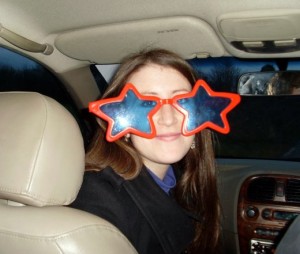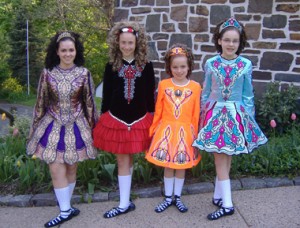
Mairead Phelan ... her Facebook profile picture.
You know you’ve really made your mark on a band when they name a song after you. On “The Turning Tide,” the most recent offering from the Irish-American supergroup Solas, the sixth track composed by fiddler Winnie Horan is entitled “A Waltz for Máiréad,” after Máiréad Phelan, the young singer from Kilkenny who stepped into the breach after the departure of Deirdre Scanlan in 2008. (Rumor has it that Horan also considered naming it the Caprese Waltz because she likes the salad, but never mind.)
“It’s so sweet to have a tune named after you,” Phelan says. “Winnie is just lovely, she feels like a sister to me.” However, she’s quick to add that the band, both on tour and in the studio, is not about divisions. “It doesn’t really feel like the boys and the girls at all. We don’t really feel outnumbered—we actually get treated like princesses!”
Unlike Scanlan, who mentions in the band’s Reunion DVD that she hadn’t initially been familiar with Solas, Phelan was a fan of their work long before she joined the band. Upon meeting the other members, “I was completely starstruck,” she admits. It’s easy to assume that coming into such a talented and well-known bunch of musicians (fine, you try to describe Solas without use of the word “supergroup,” I dare you) would be intimidating, but Phelan, surprisingly, says no.
“I had met them before at the audition, so I knew they were lovely because they made me so comfortable there in that situation, which could potentially be weird. I was just so excited and curious to see how a band I loved so much went about making music. I was definitely nervous,” she adds, “but that went away as soon as we got to actually rehearsing. It’s really a lovely way to spend your day.”
Although Phelan is remarkably candid and down-to-earth when she talks about her role in the band, you get the sense that despite the hard work and relentless touring schedule, the magic still hasn’t quite worn off for her. When you hear how she came into the band in the first place, you begin to understand why. Like Phelan, box player Mick McAuley also hails from Kilkenny. The two met while she was singing at a session there in the summer of 2007, and when Deirdre Scanlan left the band about a year later, they got in touch again.
“He asked me to send a demo CD,” she recalls, “and I didn’t have one! I had a friend who’s a guitarist, and we recorded ourselves on a mini-disc player in the bathroom, because it had an echo.” For those who are curious, the tracklist on the Máiréad Phelan Bathroom Demo included the following: Richard Thompson’s “The Dimming of the Day,” two or three traditional songs, a song from the band HEM, and one from Canadian chanteuse Feist. Here’s an odd coincidence: after recently losing her own iPod, Phelan borrowed McAuley’s only to find her own demo on it, which she hadn’t heard since it was recorded.
Like the other members of Solas, Phelan brings a wide range of musical experiences to the table. Music holds an important place in many Irish families, and hers was no exception.
“My dad plays the banjo,” she says, “And my sister’s an amazing cellist. When I was four or five, like most kids in Ireland, I was given a tin whistle. I started the flute when I was ten.” She won the All-Irelands in both flute and tin whistle when she was eleven. She also spent some years studying classical piano at the Royal Musical Academy in Dublin, but ultimately decided that that particular musical path was not for her.
“I toyed with the idea of being a classical piano player… but it was all a bit serious!” she laughs. “I also thought it was ridiculous to spend so much time talking about music instead of playing it.” Although she never received formal training as a singer, Phelan began singing when she was very young, and it was something that remained constant with her throughout her musical explorations.
“Every instrument has its perks,” she says. “Like with the piano there’s so much to work with, so many colors you can produce. But singing is very close to my heart. When I hear singers, it moves me in ways that… there’s something about singing, maybe, because it’s just purely from that person, with no medium, not a trumpet or whatever to convey what they’re feeling. Just their voice.”
From her performances on the selection of traditional and contemporary songs on “The Turning Tide,” it’s clear that Phelan has an intimate understanding of how to convey emotion with her particular vocal instrument. This is especially apparent on her haunting rendition of “Girl in the War,” a tune penned by American songwriter Josh Ritter. When the band gets together to choose songs for an album, she says, “Basically, it’s a democracy. Everybody puts in songs if they have one in mind. In this album, for example, I suggested ‘Girl in the War;’ I think Seamus (Egan, the band’s leader) suggested ‘Ghost of Tom Joad.’”
This anecdote reveals another interesting characteristic of Phelan, which is perhaps part of what makes her so versatile as a singer: her musical influences range far and wide, from female-fronted indie acts like Bat for Lashes and Florence & the Machine, to classic songwriters like Paul Simon and Bob Dylan. And of course, there’s plenty of Irish trad in there—Lunasa, At First Light, and Dervish are a few of her favorites.
What’s in Phelan’s future? Well, in the immediate future, loads of tour dates—including a show at World Café Live in Philadelphia on St. Patrick’s Day, which she’s looking forward to very much. Beyond that? “Well obviously, this is amazing, so I’ll stick it as long as I can. I just feel like the luckiest girl in the world.”


